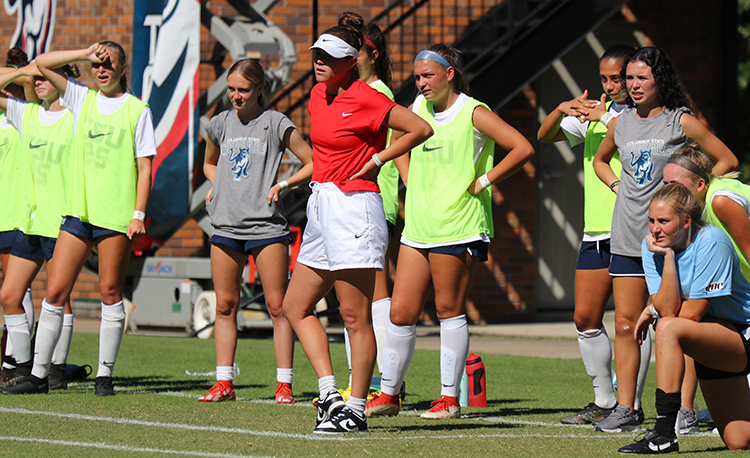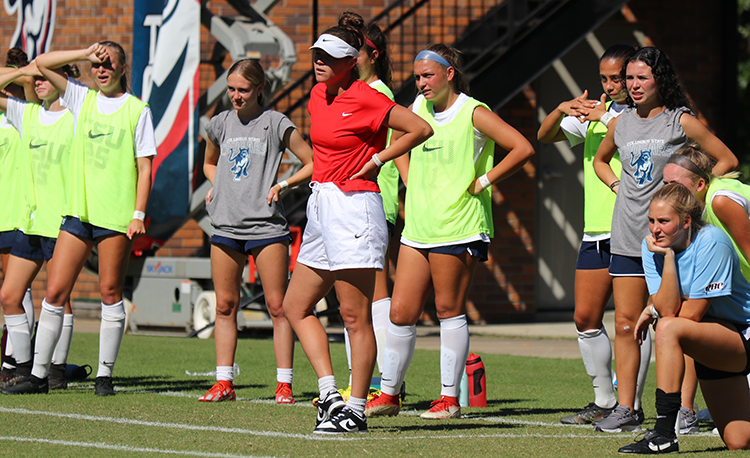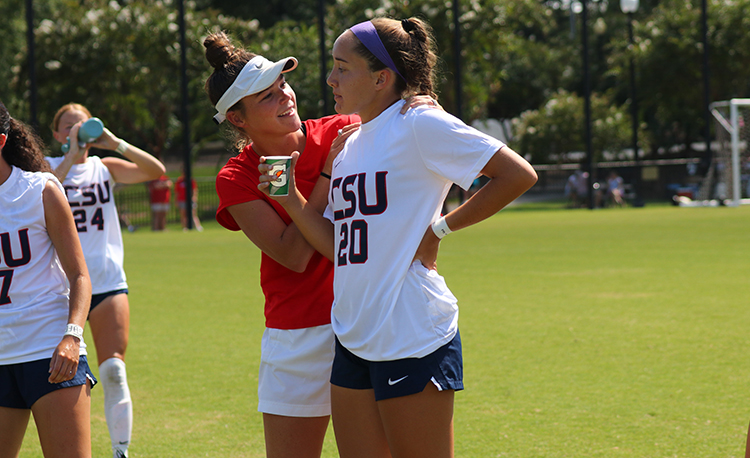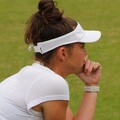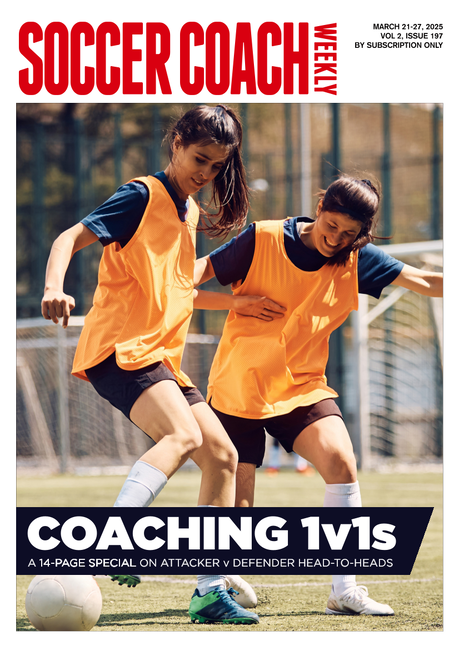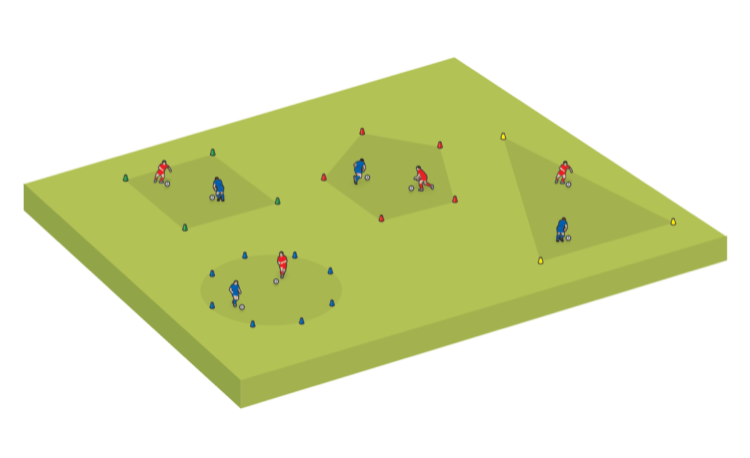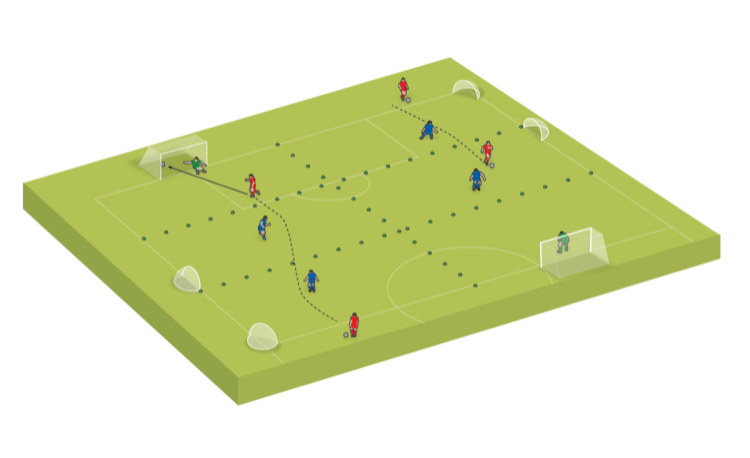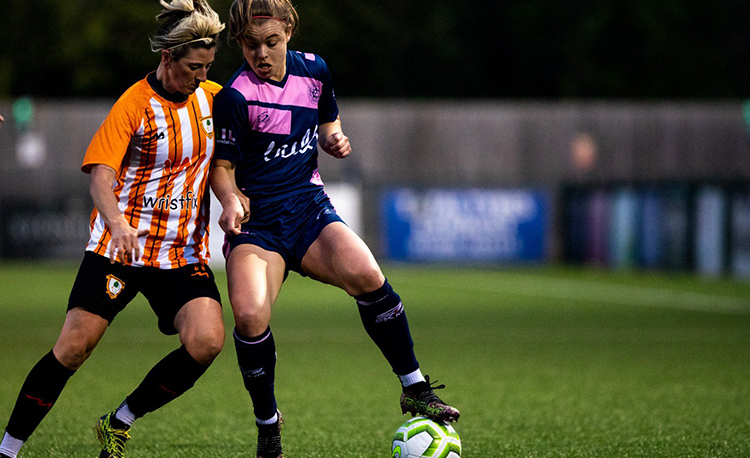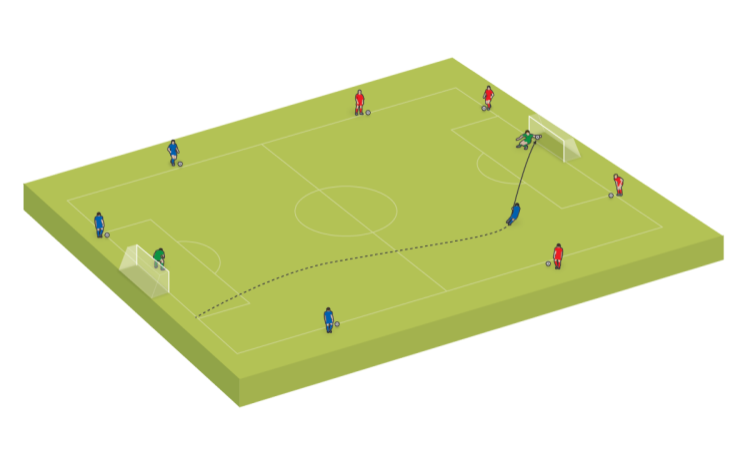Jo Fennema: Transitioning from player to coach
After being forced to quit playing aged 24, former USA youth international Jo Fennema tells Steph Fairbairn how coaching relit her passion for the game
As a player, Joanna Boyles Fennema performed at the highest level.
She spent her four college years with the North Carolina Tar Heels, represented the U17 US national team and played for the Orlando Pride in the NWSL.
Alongside success, Fennema’s playing days came with a lot of challenges – she was drafted by the Boston Breakers just before the team folded, suffered two ACL injuries while at college, discovered she has severely degenerative discs in her back.
This back injury, and subsequent hip labrum tears, led Fennema to retire at 24.
A chance encounter led her back into the game, and she is now thriving as an assistant coach at Columbus State University (CSU).
SCW caught up with Jo to talk about the transition from player to coach, and how coaches can best support players going through injuries...
SCW: What kept you mentally strong through the ups and downs you experienced?
JF: "I think it all boils down to [the fact that] I really love soccer.
"At times it’s probably not healthy, but I think my true love of the game and everything it teaches you, everything it embodies [and] all the different things about it, have always kept me coming back to it.
“With my retirement, I was like, ‘I’m not going to coach.’ I was mad at soccer because it took me out of the game. But then I was like ’I love it too much, I’m not going anywhere!’.”
SCW: As you made your transition from playing to coaching, has that love changed form? Is it a different experience?
JF: "I never relied on pure athleticism to be successful. I really had to figure out how to be successful in the game, understanding the technical side of things.
“At a young age, I always taught myself and thought about the game on a different level to help me go against superior athletes.
“So for me, when I got into coaching, [I had] to see a transition of ’how do I relay what’s in my brain to 20 or 30 kids?’.
“[I needed] to see how I could teach others to understand what I did myself for so long, I think that’s been really cool."
"My head coach takes a back seat in spring. I design and run every session..."
SCW: Do you think coaches putting themselves in uncomfortable situations in order to grow and develop is important?
JF: "I love that question, because that’s exactly what my current head coach at CSU did for me.
"I had literally just retired and after a couple of weeks he’s like, ‘You’re running the session today’.
“I’m like, ‘sorry, what?’. I obviously played, but I don’t know how to run a session. He’s like, ‘You most definitely do. So just do it.’
“I was thrown into the deep end in a very positive way. I think one of the best ways to learn is just to be thrown in and do it.
“For my development, my head coach takes a back seat in spring and I am the head coach. I design and run every session and I’m the head coach in all of the games.
"He will sit in the press box and I do the pregame, halftime, postgame talk. So every spring I’m definitely thrown into a learning environment.
"I think it’s just [about] surrounding yourself with people who push you and ask you questions.
"My girls at CSU are phenomenal. They challenge me every day, that’s for sure.
"We can only be as good as we want to be and I have to put myself in situations that make me feel uncomfortable so I can become a better coach."
SCW: What have you learned about yourself from the start of your coaching journey to now?
JF: "I would say the things that made me a successful player have translated into coaching - my will to win and my passion for the game.
"And just as much as I want our players at CSU to be themselves, I have to be authentic to myself as well - being vulnerable, being competitive, being passionate.
"I think, for a little bit, I was like ’maybe I don’t need to be that. Maybe I have to fit this mould of Coach Jo now’.
“No, I just have to be authentic. I think I learned that pretty quickly. As soon as I’m myself, things start to move.
“It’s just continuing to be myself and learn and grow, and whatever we deem success, hopefully I’ll reach it."
SCW: You have performed in a lot of elite environments and been influenced by a lot of coaches. What are some of the best experiences you’ve had under coaches?
JF: "I was lucky enough to have a lot of different coaches at the perfect time of my life.
"Growing up I had two great coaches in Scotty Schweitzer and Damon Nahas, for understanding the technical side of things. And I’m kind of psycho [about soccer], so when I went to UNC, it was nice to have Anson [Dorrance] as a head coach to really embrace that and encourage it!
"Then I was lucky enough to play for Marc Skinner, who’s now the head coach for the Manchester United women’s team. I thought he did a phenomenal job.
"I talked a lot of soccer with him - we really got along well. That was the first time I really started to chat with a coach about how he coaches, why he did certain things or the tactics of this and that, rather than just as me as an individual.
"Having those coaching conversations prepped me for the next step in my journey."
SCW: When you were going through your injuries, what was useful in terms of the support you got from coaches? What would you like coaches to know about how they can support players going through that?
JF: "As a coach, I try to give what I wanted - it’s showing that you care in a very genuine way, because people can read through somebody who’s not genuine.
"For example, if a kid tears their ACL, they are going to be bombarded with text messages in the first week. Everybody’s caring about you.
"It’s really that second and third month, where you can’t really play soccer and you can’t really run... I think that’s when it’s important that people show that they care.
"For me, just showing that you care, that you are keeping up with them and you don’t forget about them is the most important thing."
Related Files
Newsletter Sign Up
Coaches Testimonials
Subscribe Today
Discover the simple way to become a more effective, more successful soccer coach
In a recent survey 89% of subscribers said Soccer Coach Weekly makes them more confident, 91% said Soccer Coach Weekly makes them a more effective coach and 93% said Soccer Coach Weekly makes them more inspired.
*includes 3 coaching manuals
Get Weekly Inspiration
All the latest techniques and approaches
Soccer Coach Weekly offers proven and easy to use soccer drills, coaching sessions, practice plans, small-sided games, warm-ups, training tips and advice.
We've been at the cutting edge of soccer coaching since we launched in 2007, creating resources for the grassroots youth coach, following best practice from around the world and insights from the professional game.
